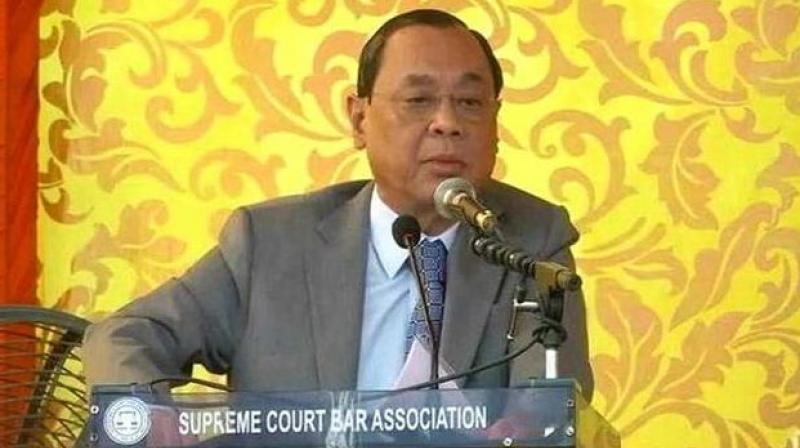CJI Ranjan Gogoi in awe' as Centre clears appointment of 4 judges in 48 hrs
SC collegium had on October 30 recommended to Centre names of 4 judges for elevation, and they took oath of office on Friday.

New Delhi: The Centre's clearing of names of four chief justices of high courts for elevation as Supreme Court judges within 48 hours of the recommendation has left Chief Justice of India Ranjan Gogoi awe-struck.
The apex court collegium, headed by the CJI and comprising its four-senior most judges, had on October 30 recommended to the Centre the names of the four judges for the elevation, and they took the oath of office on Friday.
"We sent the recommendations at about 11 o'clock on Wednesday and on Wednesday evening, when I was informed that the medical (test of the judges to be elevated) has been done, I myself was very shocked. I couldn't believe it. I said what you are saying. I am as much in awe as you are," the CJI said in an informal chat with journalists covering the apex court.
When a senior journalist asked Justice Gogoi that he has created history as he was the first person from the north-east zone to become the CJI and he got cleared the names of judges from the Centre within 48 hours, he said that the best person would be the law minister to answer this.
The CJI, who on Thursday inaugurated the Centre for Research and Planning, an "in-house think tank" also made an important announcement that the apex court would provide translated copies of its judgments to litigants in their mother tongue if they are unable to understand English. "To start with, we may do it in Hindi," the CJI said.
The CJI, who was accompanied by fourth senior most judge Justice S A Bobde and his successor during his interaction with the scribes, dismissed the query as to how he was sure that Justice Bobde would succeed him. "Yes of course. There can be no doubt on that," Justice Gogoi said and outlined his idea to tackle the cases by the benches of different strength in the future.
He said that on Mondays and Fridays, the court takes up miscellaneous cases and there was no need of many three-judge benches and this would increase the number of courts, he said.
He also made light of the recent controversy in which second senior most judge Akil Kureshi of the Gujarat High Court could not become the Acting Chief Justice as the Centre notified his junior Justice A S Dave to the post.
The post of Acting Chief Justice in the Gujarat High Court had fallen vacant due to the elevation of Justice Subhash Reddy to the Supreme Court. "We all make mistakes and we correct ourselves. Kureshi is the senior-most judge. There is no mystery in it," the CJI said, adding that a second notification corrected the mistake.
Now Justice Kureshi will remain the Acting Chief Justice of the Gujarat High Court till November 14 and he would be joining the Bombay High Court a day later.
In response to the query that the Centre has not honoured the recommendations of the collegium to appoint nearly 40 judges in high courts, the CJI said, "I did not say it has not been honoured by the government. I will not say it has not been honoured. It has been kept pending. So that's around 40. May be it could be a little more."
On the issue of "in-house think tank", the CJI said, it will help in "judicial reforms, judicial jurisprudence and judicial education".
"We have to evolve. Nobody is denying the fact that there is need for judicial reforms. I have ideas. I have ideas which are being implemented from time to time but these are the people which will be doing the research on the prevailing system in so many jurisprudence and so many jurisdictions," he said.
The think tank would give the judges inputs, and academician Mohan Gopal and his small team will give us the "inputs and the inputs will be debated by the jurists. If they are fine we will implement it".
The CJI said that it wanted to help the litigants who lose their properties after a prolonged legal battle and have been given a judgement in English which they cannot even understand.
He stressed on the need for providing judgements in vernacular languages but rued manpower crunch and other resources in implementing the idea. "At this moment it is very difficult to say whether it will be translated in other languages as well. We have a gross deficiency of resources," he said.

